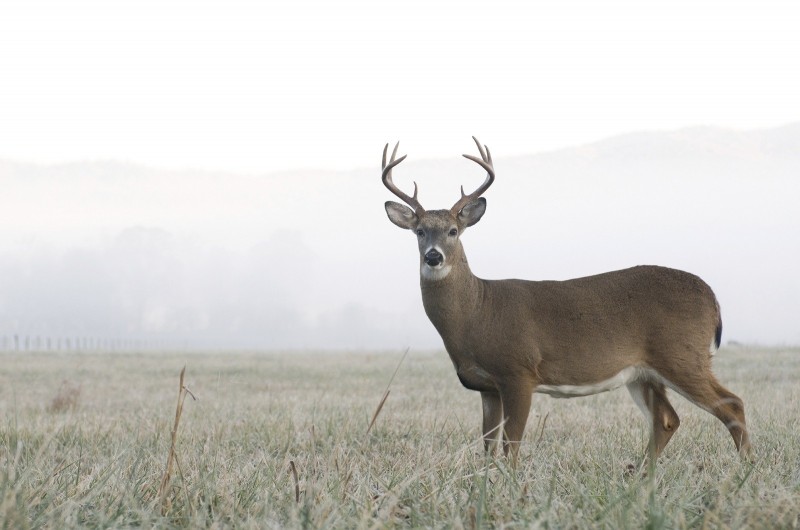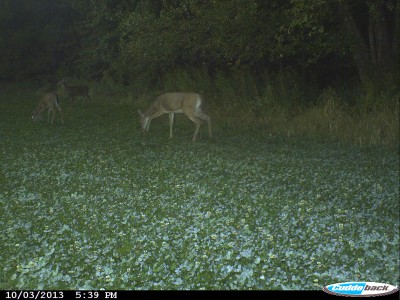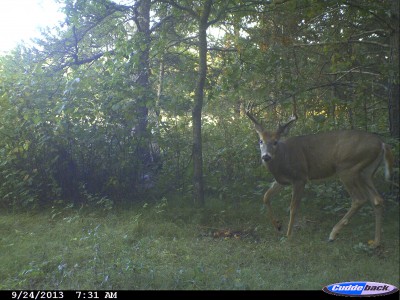Deer Hunting: Morning or Evening?

Bucks like this one in Tennessee are quite vulnerable during the rut if you are on stand for the first few hours of daylight.
Are you are morning person or a night owl? Sometimes getting up early is well worth it, other times, not so much.
I had really gotten myself into a pickle. I had chosen my stand wisely enough. I was situated along the edge of an alfalfa field and the deer were feeding in the field each evening. I glassed the field and watched a buck emerge from a trail in the woods and enter the field. I looked at the wind direction forecast and hung my stand accordingly.
The following evening I was sitting above that trail watching a few does filter by me, overflowing with optimism that it was just a matter of time before I would be dragging that buck back to my truck. A half hour before dark, my eyes roved across the dozen does and small bucks in the field, just in time to see the object of my hunt join them! He had used a different trail.
He was out of range, but several does and a yearling buck were within 25 yards. I couldn’t possibly get out of the treestand without being detected. Spooking these deer now would blow the whole operation for the future. To make matters worse, my truck was parked on the other side of the open field. Things did not end well that evening, but I did learn some important points from the experience.
You might say the best time to hunt is whenever you can, and I suppose that would be true, but most of us have real jobs and we have to choose when to hunt. There are pros and cons to hunting mornings or evenings, and the optimal time varies based on the times of the year and deer activity patterns. Let’s take a look at the options and try to sort out some of the components so you can make an informed decision on choosing your hunting time wisely.
During the last couple hours of daylight in the evening, deer often move towards the fields where they feed. It’s the most predictable time of the day to see deer.
Morning hunt pros
 During the last couple hours of daylight in the evening, deer often move towards the fields where they feed. It’s the most predictable time of the day to see deer. |
I love watching the woods come alive as daylight sweeps over the land. That alone might be reason enough for me to hunt mornings, but there are more practical reasons to be in the stand at daylight. Bucks that have been out carousing all night are often caught off guard when the sunlight touches the treetops. They suddenly have a quickness to their step and they start to focus on heading back to secure bedding cover. Doing this in a bit of a rush causes them to take more risks than they might usually.
My best buck was taken in just such a scenario. I caught him sneaking back towards the thicket where he normally beds, but he couldn’t resist stopping at a scrape I had just freshened with urine. The first two hours of daylight are peak movement times for bucks that are cruising for does during the rut. I am in the stand every morning I can be during November.
Hunting near bedding areas is great in the morning because it allows you to sneak into a treestand in the dark that you wouldn’t normally be able to get into while the deer are bedded. Some places simply allow you to get in position easier without being detected in the early morning.
Morning hunt cons
Morning hunt cons
The flip side of that coin is the possibility of spooking deer already in the bedding area by sneaking in during the predawn darkness. Unlike in the evening, deer often filter back into the bedding areas during the early morning hours well before daylight. Game cameras positioned strategically will help you make a decision on hunting these spots by showing you when the deer are moving down the trails.
Another con of morning hunting anywhere is the difficulty of getting in position quietly. You can move much more quietly in the daylight than you can in the dark. Plus, a light, even a small one, can be seen by a deer from a long ways away. Their eyes pick up about 50 times as much light as ours do, so even a small headlight looks like a beacon to them from some distance away.
 During the early season when bucks are not feeling much pressure, they often take their time getting back to the bedding areas. But once the hunting pressure ramps up, they tend to get pretty edgy if caught out during the daylight. |
Evening hunt pros
When on a bedding-to-feeding pattern, deer movement is often very predictable. This is especially true during the early part of bow season and the late part of the season when their primary focus is food. Unlike the early mornings I mentioned when they sometimes trickle in over a few hours, their evening movements are often coordinated and very visible as they move down the trails all at once, heading to fill their empty bellies. More whitetails have probably been killed in the last hour of daylight for this very reason than at any other hour of the day or night.
Another obvious advantage to the evening hunt is the ease with which you can sneak into your stand location. If you’re heading in during the daylight, you can often get yourself in position several hours in advance to allow your scent to dissipate somewhat.
Evening hunt cons
The number-one disadvantage to hunting in the evening was shown in the classic example I mentioned earlier. You often have deer around you when nighttime settles in. Once you spook them getting out of the stand in the dark, your odds of shooting one from that stand significantly diminish. That is particularly true with mature bucks who have very good memories and don’t take chances. You may not see that buck in that location for the remainder of the season.
Another disadvantage of hunting in the evening is that you will be tracking your deer in the dark, but after all, tracking a deer any time can hardly be considered a negative!
So choose your hunts and your hunting time wisely. You have only a few times at each location to make it happen and each time you hunt a stand there are little things that cause that location to have slightly less effectiveness. Whether it’s the morning or evening, play each card carefully and don’t waste your hunts by going out at the wrong time.